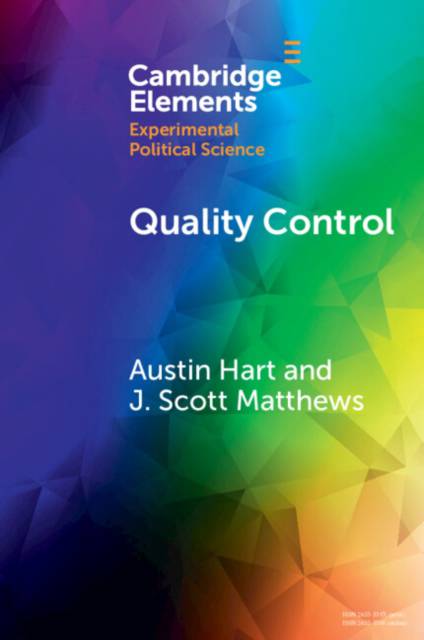
Door een staking bij bpost kan je online bestelling op dit moment iets langer onderweg zijn dan voorzien. Dringend iets nodig? Onze winkels ontvangen jou met open armen!
- Afhalen na 1 uur in een winkel met voorraad
- Gratis thuislevering in België vanaf € 30
- Ruim aanbod met 7 miljoen producten
Door een staking bij bpost kan je online bestelling op dit moment iets langer onderweg zijn dan voorzien. Dringend iets nodig? Onze winkels ontvangen jou met open armen!
- Afhalen na 1 uur in een winkel met voorraad
- Gratis thuislevering in België vanaf € 30
- Ruim aanbod met 7 miljoen producten
Zoeken
Quality Control
Experiments on the Microfoundations of Retrospective Voting
Austin Ray Hart, J Scott Matthews
€ 31,95
+ 63 punten
Omschrijving
Conventional models of voting behavior depict individuals who judge governments for how the world unfolds during their time in office. This phenomenon of retrospective voting requires that individuals integrate and appraise streams of performance information over time. Yet past experimental studies short-circuit this 'integration-appraisal' process. In this Element, we develop a new framework for studying retrospective voting and present eleven experiments building on that framework. Notably, when we allow integration and appraisal to unfold freely, we find little support for models of 'blind retrospection.' Although we observe clear recency bias, we find respondents who are quick to appraise and who make reasonable use of information cues. Critically, they regularly employ benchmarking strategies to manage complex, variable, and even confounded streams of performance information. The results highlight the importance of centering the integration-appraisal challenge in both theoretical models and experimental designs and begin to uncover the cognitive foundations of retrospective voting.
Specificaties
Betrokkenen
- Auteur(s):
- Uitgeverij:
Inhoud
- Aantal bladzijden:
- 75
- Taal:
- Engels
- Reeks:
Eigenschappen
- Productcode (EAN):
- 9781009357036
- Verschijningsdatum:
- 31/08/2023
- Uitvoering:
- Paperback
- Formaat:
- Trade paperback (VS)
- Afmetingen:
- 152 mm x 229 mm
- Gewicht:
- 131 g

Alleen bij Standaard Boekhandel
+ 63 punten op je klantenkaart van Standaard Boekhandel
Beoordelingen
We publiceren alleen reviews die voldoen aan de voorwaarden voor reviews. Bekijk onze voorwaarden voor reviews.











